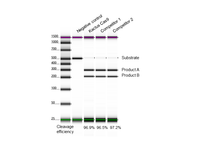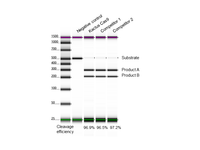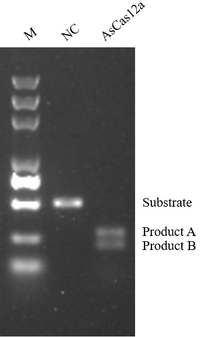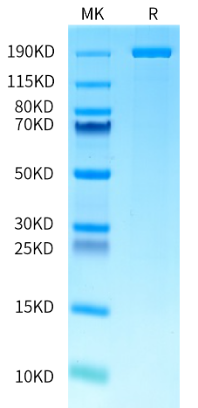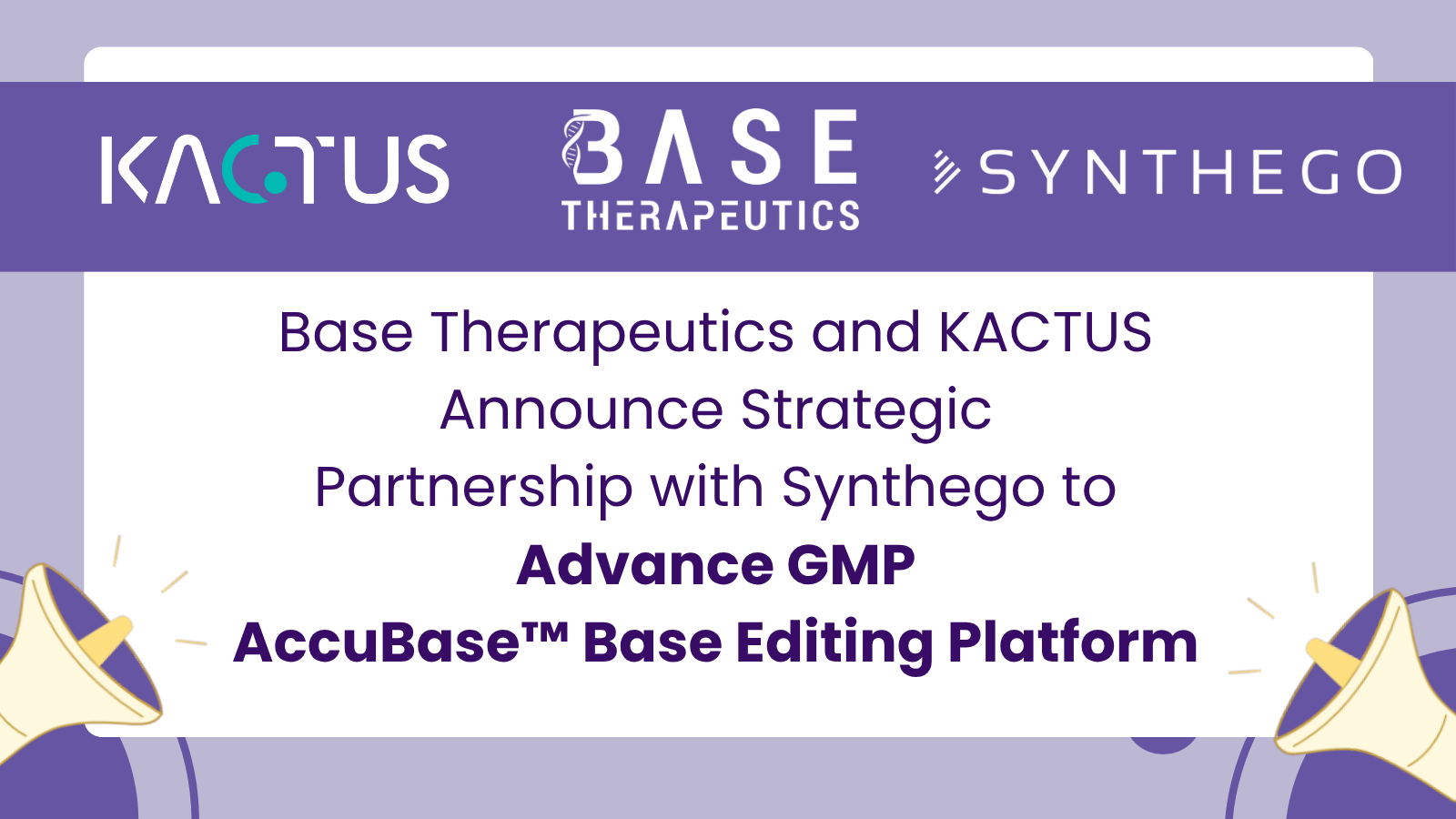Empowering Gene Editing Therapy: The Atlas of Gene Editing Enzymes from KACTUS
By Yujiao Zhang
Overview
By leveraging its sophisticated ‘Structure Aided Design and Multiplex Screening (SAMS™)’ platform, along with extensive experience in process development including protein expression, purification, and formulation, KACTUS has successfully produced a series of proteins and enzymes for cell therapy with high stability, high purity, and high activity. These enzymes are manufactured and documented in strict compliance to the cGMP standard, meeting the dual-filing requirements for clinical trials in China and the United States.
In addition to the GMP-grade Cas9 and Cas12a, which have been routinely provided on the market, KACTUS is now innovatively providing the first commercially available GMP-grade cytosine base editors (CBEs). With a substantial variety of products available, KACTUS aims to provide a ‘one-stop mode’ supply for gene editing enzymes to clients around the world.
Development of Gene Editing Tools
From the initial ZFNs to TALENs, to the revolutionary CRISPR/Cas system, and the new generation of editing technology developed from CRISPR/Cas, such as single-base editing and prime editing, the gene editing technology underwent continuous evolution in past decades. The rapid development of gene editing tools aiming for higher editing efficiency, lower off-target effects, and higher safety, has significantly offered more possibilities for both in vivo and in vitro applications and, subsequently, accelerated gene editing therapeutic research and development.
Table 1: Types of Gene Editing Tools [1]

Among all the gene editing studies, the CRISPR/Cas9 technology is the most extensively investigated, with nearly 20,000 papers published and being widely applied in the scientific research, diagnostics, and drug development pipelines. With only 10 years from technology development to commercial drugs approved for treatments, the CRISPR/Cas9 technology sets a new historical speed of translational research.
The World’s First CRISPR/Cas9 Gene Editing Therapy Was Approved for Market in the United Kingdom
On November 16, 2023, the UK Medicines and Healthcare Products Regulatory Agency (MHRA) officially announced the approval of Casgevy, a CRISPR gene editing therapy collaboratively developed by Vertex Pharmaceuticals and CRISPR Therapeutics. It is approved for patients aged 12 and older with recurrent vaso-occlusive crisis in sickle cell disease (SCD) and for patients with transfusion-dependent β-thalassemia (TDT).
 |
 |
This therapy utilizes ex vivo electroporation to introduce sgRNA and Cas9 enzyme into patients' autologous hematopoietic stem cells (HSCs) for editing, making it the world's first approved CRISPR gene editing therapy. The Biologics License Application (BLA) of Casgevy has also been accepted and granted priority review by the Food and Drug Agency (FDA) in the United States. The PDUFA (Prescription Drug User Fee Act) date for SCD is December 8, 2023 and March 30, 2024 for TDT.
In vivo CRISPR/Cas9 Gene Editing Therapy Enters Phase III Clinical Trials in the United States
On October 18, 2023, Intellia Therapeutics announced FDA clearance of Invetigational New Drug (IND) Application of its in vivo CRISPR gene editing therapy, NTLA-2001, to initiate the pivotal Phase III clinical trial. NTLA-2001 is the world's fastest-progressing in vivo CRISPR gene editing therapy targeting transthyretin (ATTR, a thyroid hormone transport protein) amyloidosis with cardiomyopathy

There is a wide variety of members in the Cas protein family. Cas12 (identified in 2015) and its subsequently modified variants, have numerous applications in the molecular diagnostics and clinical research pipelines. Compared to Cas9, Cas12 has a different PAM (Protospacer Adjacent Motif) recognition sequence and creates a staggered, or “sticky end” cut. This type of cut can be advantageous for certain types of gene editing, as the overhanging ends can facilitate the insertion of new genetic material. Meanwhile, Cas12 only requires crRNA (Cas9 requires both crRNA and an additional tracrRNA), making an overall smaller molecule size and a simplifier delivery, yet its cutting efficiency is similar to that of Cas9.
Ex Vivo CRISPR/Cas12a Gene Editing Therapy
Editas Medicine recently announced that the FDA has granted its investigational gene editing therapy, EDIT-301, the Regenerative Medicine Advanced Therapy (RMAT) designation for the treatment of Sickle Cell Disease (SCD). EDIT-301 utilizes the AsCas12a nuclease to edit patients' hematopoietic stem cells, aiming to increase the expression levels of fetal hemoglobin and potentially provide lasting benefits to patients with SCD and transfusion-dependent β-thalassemia via single treatment. The therapy is currently undergoing Phase I/II clinical trials.

Furthermore, the development of base editor technology, hailed as 'CRISPR 2.0', is rapidly evolving. Base editors (BEs), developed based on Cas9, have overcome many limitations of traditional nucleases that can achieve precise gene correction through single-base conversion without relying on DNA double-strand breaks.
Single-Base Gene Editing Therapy was Approved for Clinical Trials in the U.S.
In October 2023, Verve Therapeutics, a company focused on gene editing therapies, announced the FDA clearance of the IND application for VERVE-101. VERVE-101 is a single-base editing therapy developed for the treatment of heterozygous familial hypercholesterolemia (HeFH). This marks the first in vivo single-base editing therapy approved for clinical trials in the United States.

The ‘In-stock’ Atlas of Gene Editing Enzymes from KACTUS
Gene editing methods are divided into ex vivo and in vivo types. According to statistics, most of the current gene editing clinical trials use the ex vivo editing approach [2]. The ex vivo method utilizes RNP (ribonucleoprotein) and electroporation for sgRNAs and nuclease delivery to maximumly guarantee safety. Therefore, high-quality, GMP-grade gene editing enzymes are one of the most important and indispensable raw materials for gene editing.
KACTUS currently provides the following research-grade and GMP-grade gene editing enzymes. Through continuous refinement of its technology platform, KACTUS will offer more and more reliable gene editing tools, thereby contributing to the advancement and widespread application of gene editing technology for therapeutic purposes. KACTUS supports bespoke enzyme development through custom protein expression services can provide tailored solutions to optimize these critical parameters.
→ Cas9
GMP-grade, FDA DMF (Drug Master File) registered, successfully applied in IND (Investigational New Drug) clinical pipelines.
→ AsCas12a
High gene editing efficiency, staggered (sticky ends) cut, smaller RNA molecule size, providing more options to fulfill different needs.
→ AccuBaseTM
GMP-grade Cytosine Base Editor (CBE), does not generate DNA double-strand breaks, nearly zero off-target risk; independently developed by Base Therapeutics and authorized to KACTUS the rights of global manufacturing and commercialization.
|
Catalog |
Name |
Size |
|
Cas9 Nuclease (GMP-Grade) |
3mg |
|
|
Cas9 Nuclease (Research-Grade) |
100ug |
|
|
SpCas9 D10A Nickase (GMP-Ready) |
100ug/1mg |
|
|
AsCas12a Nuclease (GMP-Ready) |
100ug/1mg |
|
|
BS-EP1 (AccuBaseTM GMP-Grade) |
1mg |
|
|
BS-EP1 (AccuBaseTM Research-Grade) |
200ug/500ug/1mg |
Click catalog number for product details.
Note: BS-EP1 is product name, AccuBaseTM is commercial name
About KACTUS
KACTUS was founded in 2018 and is a company focused on the upstream sector of the biopharmaceutical industry, driven by independent innovation and specializing in the production of enzymes for CGT manufacturing. Relying on its unique protein research and development platform, SAMS™, KACTUS has entered the antibody drug market from the challenging field of custom transmembrane proteins and, with its high-quality products, expanded into the fields of cell and gene therapy as well as RNA therapy—including complex membrane-bound targets such as solute carrier proteins, which require specialized techniques for efficient expression. More information can be found on our SLC protein expression services page.
In the field of gene therapy, KACTUS provides localized GMP-grade Cas9 enzymes that meet the clinical needs of gene editing. KACTUS also supplies GMP-grade MaxNuclease for AAV and vaccine research, MHC complexes for cell therapy, and enzymes for GMP manufacturing of mRNA. KACTUS has filed multiple GMP-grade enzyme products with the FDA Drug Master Files (DMF). KACTUS’ GMP products are strictly tested and validated according to pharmacopeia methodologies and are equipped with an MES digital production management system, ensuring high batch-to-batch consistency and strict compliance with regulatory submission requirements.
KACTUS has a professional technical team of nearly 200 people, a 10,000 square-meter GMP-grade enzyme manufacturing facility, and a 5,000 square-meter R&D facility and operates on a global scale.
Contact Us
Official Website: kactusbio.com
Address: 60 Hickory Drive, Waltham, MA, United States, 02451
Email: Inquiry and Quote: sales@kactusbio.us
PO and Status: orders@kactusbio.us
Scientific Support: support@kactusbio.us
Tel: 1 (617) 665-7333
Fax: 1 (617) 665-7333
References
[1] Wang Rui. Research Progress of New Generation Gene Editing Tools [J]. Journal of China Pharmaceutical University, 2022, 53(6): 633-642.
[2] Wang D, Zhang F, Gao G. CRISPR-Based Therapeutic Genome Editing: Strategies and In Vivo Delivery by AAV Vectors. Cell. 2020 Apr 2;181(1):136-150.



